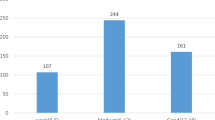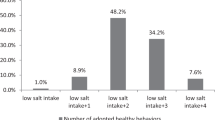Abstract
Uncontrolled hypertension leads to cardiovascular complications and organ damage. Self-care practice is crucial for the prevention and management of hypertension by improving quality of life, preventing complications and decreasing health care expenditure. The study aimed to assess self-care practice and its associated factors among hypertensive follow up patients at East Gojjam Zone public hospitals; in Northwest Ethiopia. Quantitative cross-sectional study design and qualitative phenomenological approach were applied. The quantitative result was supported by in-depth interview. Out of 480 patients included in the study, 49% have good self-care practices. Out of the total participants 44.6% have poor in antihypertensive medication adherence, 92.5% have low in diet management, 82.8% were poorly practiced physical activity and 62.5% poor practice to weight management. Participants who cannot read and write (AOR = 3.1, 95% CI: 1.6–5.9), and have no comorbidity (AOR = 0.4, 95% CI: 0.2–0.6), uncontrolled blood pressure status (AOR = 2.1, 95% CI: 1.2–3.6), poor social support status (AOR = 2.5, 95% CI: 1.5–4.3) and unfavorable attitude (AOR = 3.1, 95% CI: 1.9–5.2) are the factors for poor self-care practice. During interview; family meal preparation habits, inadequate information about self-care practice during follow-up time, inconvenient working environment, pressure during social events to share food, negligence, and poor self-efficacy were highly described as challenges for practicing and sustaining self- care. The level of hypertension self-care practices was found to be low. Therefore, hypertension self-care practices should be strengthened throughout their follow-up time, and creating awareness in the community is highly encouraged.
This is a preview of subscription content, access via your institution
Access options
Subscribe to this journal
Receive 12 digital issues and online access to articles
$119.00 per year
only $9.92 per issue
Buy this article
- Purchase on Springer Link
- Instant access to full article PDF
Prices may be subject to local taxes which are calculated during checkout

Similar content being viewed by others
Data availability
All materials and data are available from the corresponding author without any restriction.
References
World Health Organization. A global brief on hypertension silent killer, global public health crisis: World Health Day 2013. World Health organization; 2013, https://apps.who.int/iris/handle/10665/79059.
Kibret KT, Mesfin YM. Prevalence of hypertension in Ethiopia: a systematic meta-analysis. Public Health Rev. 2015;36:14.
Bacha D, Abera H. Knowledge, attitude and self-care practice towards Control of hypertension among hypertensive patients on follow-up at St. Paul’s Hospital, Addis Ababa. Ethiopian J Health Sci. 2019;29:421–30.
Williams B, Mancia G, Spiering W, Agabiti Rosei E, Azizi M, Burnier M, et al. 2018 ESC/ESH Guidelines for the management of arterial hypertension. Eur Heart J. 2018;39:3021–104.
Vanitha D, Anitha Rani M. Knowledge and Practice on lifestyle modifications among males with hypertension. Indian J Comm Health. 2015;27:143–9.
Mengistu MD. Pattern of blood pressure distribution and prevalence of hypertension and prehypertension among adults in Northern Ethiopia: disclosing the hidden burden. BMC Cardiovascular Disord. 2014;14:33.
Tibebu A, Mengistu D, Negesa L. Adherence to recommended lifestyle modifications and factors associated for hypertensive patients attending chronic follow-up units of selected public hospitals in Addis Ababa, Ethiopia. Patient Prefer Adherence. 2017;11:323–30.
Buda ES, Hanfore LK, Fite RO, Buda AS. Lifestyle modification practice and associated factors among diagnosed hypertensive patients in selected hospitals, South Ethiopia. Clin Hypertension. 2017;23:26.
Hu H, Li G, Arao T. Prevalence rates of self-care behaviors and related factors in a rural hypertension population: a questionnaire survey. Int J Hypertens. 2013;2013:526949.https://doi.org/10.1155/2013/5269.
Motlagh SFZCR, Sadeghi E, Eslami AA. Self-care behaviors and related factors in hypertensive patients. Iran Red Crescent Med. J. 2016;18:e35805.
Beigi MABZM, Aghasadeghi K, Jokar A, Shekarforoush S, Khazraei H. The effect of educational programs on hypertension management. Int Cardiovasc Res J. 2014;8:94–8.
Labata BG, Ahmed MB, Mekonen GF, Daba FB. Prevalence and predictors of self-care practices among hypertensive patients at Jimma University Specialized Hospital, Southwest Ethiopia: cross-sectional study. BMC Res Notes. 2019;12:86. https://doi.org/10.1186/s13104-019-4125-3.
Warren-Findlow J, Seymour RB, Huber LRB. The association between self-efficacy and hypertension self-care activities among African American adults. J Community Health 2012;37:15–24.
Ian Mcdowell. Measuring health: a guide to rating scales. Stat Med. 1989;8:1308–9.
World Health Organization. Technical package for cardiovascular disease management in primary health care: evidence-based treatment protocols. World Health Organization. https://apps.who.int/iris/handle/10665/260421. 2018.
Whelton PK, Carey RM, Aronow WS, Casey DE Jr, Collins KJ, Dennison Himmelfarb C, et al. ACC/AHA/AAPA/ABC/ACPM/AGS/APhA/ASH/ASPC/NMA/PCNA guideline for the prevention, detection, evaluation, and management of high blood pressure in adults: executive summary: a report of the American College of Cardiology/American Heart Association Task Force on clinical practice guidelines. Hypertension. 2018;71:1269–324. https://doi.org/10.1161/HYP.0000000000000066.
Abdulwahed A, Seid A. Level of self-care practice and associated factors among hypertensive patients in Jimma University Specialized Hospital, South West Ethiopia. Rehabilitation Sci. 2020;5:12–17. https://doi.org/10.11648/j.rs.20200502.11.
Rachael Oluwafunmilayo A, Okafor NA, Ojo IC. Knowledge and practice of lifestyle modification among hypertensive patients in a General Hospital Lagos. IOSR J Nurs Health Sci. 2020;9:40–45. https://doi.org/10.9790/1959-0902054045.
Abiy Tadesse A, Geltore TE. Lifestyle modification practice and associated factors among diagnosed hypertensive patients in Mizan Tepi university teaching hospital south West Ethiopia, 2019: cross-sectional study. PAMJ Clin Med. 2020;2:156. https://doi.org/10.11604/pamj-cm.2020.2.156.20010.
Nadewu AN, Geda B. Adherence to healthy lifestyle among hypertensive patients in Harar region, Eastern Ethiopia. Prim Health Care. 2018;8, https://doi.org/10.4172/2167-1079.1000308.
Fetensa GMN, Besho M, Hasen T, Teshoma M, Wakuma B, Etefa W, et al. Assessment of knowledge and practice of life style modification among hypertensive patients at Nekemte Specialized Hospital, Western Oromia. J Cardiovas Dis Diagn. 2019;7:389.
Lama A, Bakhsh AAA, Murad MA, Nourah RM, Hanbazazah SA, Aljahdali AA, et al. Awareness and knowledge on hypertension and its self-care practices among hypertensive patients in Saudi Arabia Ann Int Med. Dental Res. 2017;3:ME58–62.
Ademe S, Aga F, Gela D. Hypertension self-care practice and associated factors among patients in public health facilities of Dessie town, Ethiopia. BMC Health Serv Res. 2019;19:51. https://doi.org/10.1186/s12913-019-3880-0.
Tusubira AK, Nalwadda CK, Akiteng AR, Armstrong-Hough M, Hsieh E, Ngaruiya C et al. Self-care practices and needs in patients with hypertension, diabetes, or both in rural Uganda: a mixed-methods study. The Lancet Global Health. 2020;8:S19. https://doi.org/10.1016/s2214-109x(20)30160-1.
Tibebu A, Mengistu D, Negesa L. Adherence to recommended lifestyle modifications and factors associated for hypertensive patients attending chronic follow-up units of selected public hospitals in Addis Ababa, Ethiopia. Patient Prefer Adherence 2017;11:323–30. https://doi.org/10.2147/PPA.S126382.
Kimani S, Mirie W, Chege M, Okube OT, Muniu S. Association of lifestyle modification and pharmacological adherence on blood pressure control among patients with hypertension at Kenyatta National Hospital, Kenya: a cross-sectional study. BMJ Open 2019;9:e023995 https://doi.org/10.1136/bmjopen-2018-023995.
Ezeala-Adikaibe BA, Mbadiwe N, Okudo G, Nwosu N, Nwobodo N. Factors associated with medication adherence among hypertensive patients in a tertiary health center: a cross-sectional study. Arch Community Med. Public Health. 2017;3:024–31. https://doi.org/10.17352/2455-5479.000021.
Adisa R, Ilesanmi OA, Fakeye TO. Treatment adherence and blood pressure outcome among hypertensive out-patients in two tertiary hospitals in Sokoto, Northwestern Nigeria. BMC Cardiovasc Disord. 2018;18:194. https://doi.org/10.1186/s12872-018-0934-x.
Gee ME, Bienek A, Campbell NR, Bancej CM, Robitaille C, Kaczorowski J, et al. Prevalence and barriers to, preventive lifestyle behaviors in hypertension (from a national survey of Canadians with hypertension). Am J Cardiol. 2012;109:570–5.
Akbarpour S, Khalili D, Zeraati H, Mansournia MA, Ramezankhani A, Fotouhi A. Healthy lifestyle behaviors and control of hypertension among adult hypertensive patients. Sci Rep. 2018;8:8508.
Williams B, Mancia G, Spiering W, Agabiti Rosei E, Azizi M, Burnier M, et al. 2018 ESC/ESH Guidelines for the management of arterial hypertension [published correction appears in Eur Heart J. 2019;40:475]. Eur Heart J. 2018;39:3021–104. https://doi.org/10.1093/eurheartj/ehy339.
Acknowledgements
We would like to express our great thanks to Debre-Markos University, College of health science for their willingness and support. Next, our great thanks also go to the hospital administrators of the study area. Lastly, we acknowledge our data collectors, supervisors, and friends that support us throughout our work.
Funding
The work was supported by Debre-Markos University, College of health sciences. The content is solely the responsibility of the authors and does not necessarily represent the official views of the funders. The funders had no role in the study design, data collection, and analysis, decision to publish, or preparation of the manuscript.
Author information
Authors and Affiliations
Contributions
BA and HZ performed the analysis and interpretations. TS wrote the first draft, and BA, HZ, MM and NM contributed to the design of the study and substantive revision of the final draft. All authors read and approved the final manuscript.
Corresponding author
Ethics declarations
Competing interests
The authors declare no competing interests.
Ethical approval and consent to participate
Ethical approval (246/14) for the study was obtained from Debre Markos University health Science College, an ethical review approval, and a supporting letter was obtained from the selected hospital administration. Data were collected after informed verbal consent is obtained from the participants. Confidentiality of the information was maintained by excluding names as identification in the questionnaire & keeping their privacy during the data collection.
Additional information
Publisher’s note Springer Nature remains neutral with regard to jurisdictional claims in published maps and institutional affiliations.
Rights and permissions
Springer Nature or its licensor (e.g. a society or other partner) holds exclusive rights to this article under a publishing agreement with the author(s) or other rightsholder(s); author self-archiving of the accepted manuscript version of this article is solely governed by the terms of such publishing agreement and applicable law.
About this article
Cite this article
Assefa, B., Zeleke, H., Sergo, T. et al. Self-care practice and associated factors among hypertensive follow-up patients at East Gojam zone public hospitals, North West Ethiopia, 2021. J Hum Hypertens 37, 854–861 (2023). https://doi.org/10.1038/s41371-022-00775-w
Received:
Revised:
Accepted:
Published:
Issue Date:
DOI: https://doi.org/10.1038/s41371-022-00775-w



